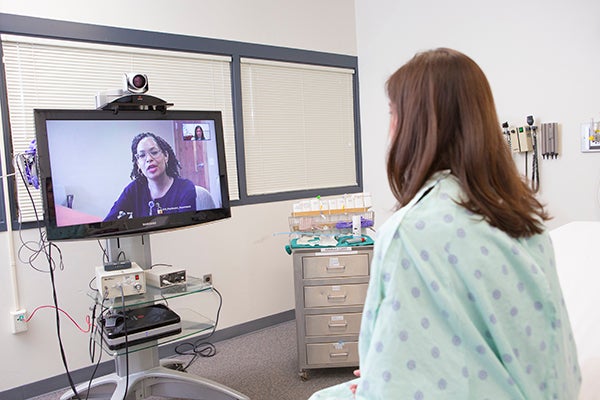INNOVATIVE HEALTH CARE
ECU-led telepsychiatry program earns state award for technology innovation
The East Carolina University-led North Carolina Statewide Telepsychiatry Program (NC-SteP) has won the 2022 Innovation Award for technology from North Carolina’s i2i Center for Integrative Health.
The award celebrates innovation in services and programs that improve approaches to health care. The i2i Center for Integrative Health convenes health care leaders to solve the most important issues affecting behavioral, intellectual and developmental disabilities and primary health care in North Carolina.
NC-STeP — established through state legislation in 2013 with $2 million in annual funding — connects hospital emergency departments across North Carolina to provide psychiatric assessments and consultations to patients linked using telemedicine technologies while in the emergency department, helping prevent unnecessary hospitalizations. In 2018, NC-STeP expanded its scope to community-based settings. It is overseen by the N.C. Department of Health and Human Services’ Office of Rural Health and Community Care.
NC-STeP is based at ECU’s Center for Telepsychiatry and e-Behavioral Health and is led under the direction of Sy Saeed, professor and chair emeritus of the Department of Psychiatry and Behavioral Medicine at the Brody School of Medicine, executive director of NC-STeP and director of the ECU Center for Telepsychiatry and E-Behavioral Health (CTeBH). Much of Saeed’s work with the programs focuses on using telepsychiatry to provide mental health care in remote and underserved areas where psychiatric services are scarce.

Thirty-nine hospital emergency departments in North Carolina are enrolled in the NC-STeP network. (ECU file photo)
As of September, NC-STeP has completed 55,816 psychiatry assessment in hospital emergency departments and has prevented more than 9,000 unnecessary psychiatric hospitalizations across the state, saving North Carolina more than $49 million. The program has also served more than 14,000 patients in community-based setting, all in underserved areas; more than 32% of the patients served by NC-STeP had no insurance when presenting at the emergency department.
“NC-STeP is receiving the award for ‘innovative technologies that assist individuals with care access,’” Saeed said. “The program is now also providing access to psychiatric care in rural communities at 23 sites. Regarding the ‘innovation’ part, the program has developed a web portal to link different electronic health records. There have been two scientific papers published on this to report the innovation. Of note, no such solutions existed to solve this problem until the solution developed by NC-STeP.”
In 2013 when the program was created, North Carolina hospitals had 162,000 behavioral health emergency visits to hospitals. In 2010, patients with mental illness made up 10 percent of all emergency room visits in North Carolina, and people with mental health disorders were admitted to the hospital at twice the rate of those without.
“Behavioral health needs within the United States are a growing crisis,” Saeed said. “In North Carolina alone, 31 out of 100 counties have no psychiatrists. The number of counties without any active behavior health provider currently stands at 13, while 35 counties have less than one provider per 10,000 people.”
According to data from the Substance Abuse and Mental Health Services Administration, only 45.3% of adults with mental illness in North Carolina receive any form of treatment from either the public system or private providers. The remaining 54.7% receive no mental health treatment. According to federal guidelines, 94 counties in North Carolina qualify as health professional shortage areas.
Emergency department utilization
Currently, 39 hospital emergency departments in North Carolina are enrolled in the NC-STeP network. Most of these emergency departments are in rural underserved areas that have limited if any access to a psychiatrist. By utilizing telemedicine technology, NC-STeP provides services to these emergency departments. In addition, NC-STeP provides psychiatric services at 22 outpatient community-based sites across the state and this number is growing rapidly.
Shortly after its creation, NC-STeP began education and telehealth implementation to stakeholders in emergency departments across the state, providing the telemedicine equipment, installation, education and implementation of each hospital emergency department in our network. This work is still on going as new hospital emergency departments enroll in the program. NC-STeP utilizes a network of clinical provider hubs with 52 consultant providers located across the state to provide service to 39 partner hospitals across North Carolina. These hubs serve a geographic region within the state which enables them to understand behavioral health resources available in the region of the hospitals they are serving.
The statewide team approach is making a difference for patients in rural communities.
“The average length of stay for patients being presented for NC-Step consults has been reduced dramatically,” Saeed said.
Other benefits of the program impact the spectrum from patients to state entities. Patient benefits include a reduced burden on patients and families by providing care access close to home and an improvement in overall quality of life. Communities benefit from reduced crime and homelessness and an increased sense of patients’ self-reliance. N.C. Medicaid and other third-party payors experience cost savings from reducing unnecessary hospitalizations. Local sheriffs’ departments resources are freed up from transporting patients from hospitals to psychiatric facilities, and hospitals save money from less strain on resources and reduced cost of psychiatric consults.
Not only are North Carolina’s hospitals embracing telepsychiatry as a way to ease that stress, but other states are eyeing ECU’s model — a trend that stands to change the future of mental health care across the state and beyond.
Local health departments are jumping on board, too. Battle Betts Jr. is health director at Albemarle Regional Health Services in Elizabeth City, the first local health department to pilot the NC-STeP program.
“Based on the success of the initial NC-STeP program, it was a natural progression to expand the program into local health departments,” Betts said. “Since 2016 when we first ventured into this arena, more than 80 different area providers have referred their patients to us for care. Behavioral health needs continue to rise in today’s society, and Dr. Saeed’s innovative vision has made great progress toward seeing that all residents of our state have access to quality care close to home.”
For its innovative work, NC-STeP was one of four programs — and the only one in behavioral health — showcased at a White House convening on telehealth in 2016. NC-STeP was also a recipient of the 2020 Breaking Barriers Through Telehealth Award from the Mid-Atlantic Telehealth Resource Center for providing telepsychiatry services to individuals experiencing acute behavioral health crises in hospital emergency departments across North Carolina. The program has published findings from its work in more than a dozen peer-reviewed publications and has presented its findings in over 50 presentations nationally and across the globe.
Saeed won the 2019 Oliver Max Gardner Award, the highest faculty honor given by the UNC Board of Governors, for his work with NC-STeP and telepsychiatry.
The i2i Center for Integrative Health uses collaboration and advocacy to address behavioral, I-DD, and primary health care, bringing together a broad spectrum of leaders with the goal of ensuring effective whole person care within the publicly funded system. The organization operates alongside an appointed board of health care and industry leaders.
